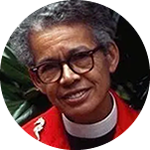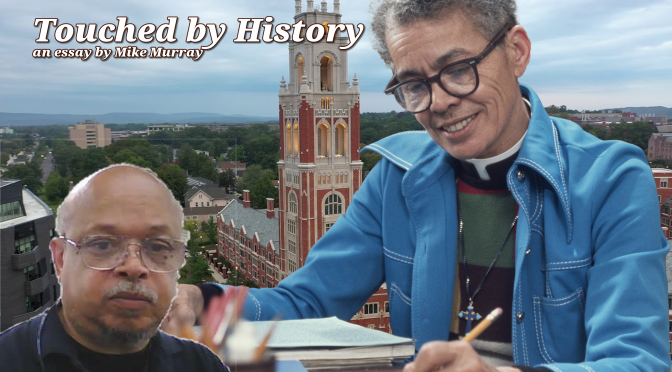To her birth parents, she was known as Anna Pauline Murray.
Born in 1910 in Baltimore, MD, she was orphaned at a very early age and sent to live with her aunts in Durham, NC. That part of her story can be found in the first of two autobiographies she wrote about her life, family, and journey. That book is Proud Shoes: The Story of an American Family, published by Harper & Row in 1956, twenty years before a similarly titled book by Alex Haley.
To me, she was Aunt Pauli, one of my father’s four sisters, along with one brother. She would enter and hover over my life throughout my childhood, sometimes as a distant figure and other times like a third parent.
My earliest memory of Aunt Pauli was of a tree-lined street in Brooklyn known as Chauncey, which she shared with her two aunts from Durham and the fictional characters known as the Kramdens and the Nortons. However, Aunt Pauli and great Aunts Pauline and Sallie were nothing like those folks. Aunt Pauli was working at the Manhattan law firm of Paul Weiss, Rifkind, Wharton, and Garrison and about to take a sojourn to Accra, Ghana, to teach at the Ghana School of Law. History records that journey took place in 1960; so, I was but seven years old.
While there, Aunt Pauli apparently researched the government and constitution of that fledgling republic, founded 1 July 1960, and became somewhat more involved in Ghanaian intrigue than she intended. Subsequently, she returned to the United States and published, along with Leslie Rubin, a book on the Government and Constitution of Ghana in 1961.
She moved to New Haven, CT, to study for her doctorate in law. During that period, I can remember traveling to New Haven many times. My memories of New Haven are ephemeral. I remember that she bought me my first watch there. I remember she lived on Dixwell Avenue, and I used to walk her dog around the block. Aunt Pauli had three dogs that I remember throughout her lifetime. She probably had more, but I knew of Smokey, Doc, and Roy. I don’t remember which of the three dogs I was shepherding at the time, but New Haven was where I gained my dislike for what I call “rat dogs.” These are small dogs that feel like they can take on the world and are constantly yapping, especially when a larger dog happens by.
Aunt Pauli received her JSD at Yale University’s School of Law in 1965. I was twelve by then. When Aunt Pauli returned from Ghana, she imported the Volkswagen Karmann Ghia she had purchased there. Until 1974 Ghana, unlike the United States, drove on the left side of the road. So, the steering wheel and drive mechanisms were on what would be the passenger side in the USA. Until 1983, the Connecticut Turnpike had nine toll plazas; four in the stretch between the New York State border and New Haven. So, Aunt Pauli had to devise a method of paying the tolls from her driving position. Imagine, if you will, driving up to a toll booth to be greeted either by a dog, a young child, or a fly swatter attached to a yardstick. Like many differently-abled, the world is what you make of it. If it doesn’t fit, you make alterations.
I have stated elsewhere that I am a child of the television generation. So, much of what I remember over the years is formed by what I saw on The Tube. In 1968, while turmoil was raging in Chicago, Aunt Pauli and I traveled in New England to a small privately owned island in Machias Bay known as Yellowhead Island (now known as Yellow Head Island).
We may have traveled from Boston or New Haven. I can’t remember. What I do remember is traveling during the trip to Campobello Island, New Brunswick. It was my first trip outside of the United States. She took me there to see the Roosevelt retreat. Aunt Pauli was friends with former First Lady Eleanor Roosevelt. She once took my entire family to lunch with Mrs. Roosevelt at her home in Hyde Park, NY. Aunt Pauli’s friendship with Mrs. Roosevelt is chronicled in the book The Firebrand and the First Lady by Patricia Bell Scott.
Anyway, that August of 1964, I had just celebrated my 11th birthday. We were traveling to visit the summer home of Dr. Caroline Ware and her husband, Dr. Gardiner C. Means. They had a cabin on a bluff on Yellowhead Island, and, at that time, there was no television, only radio. Dr. Means often took me out on his boat, and I learned how to steer a boat with a rear-mounted outboard motor. Whatever turmoil was happening in Chicago, we could only grasp by nightly listening to the radio.
At that age, I was only marginally aware of my sexuality. During the day on the island, left to my own amusement, I would strip out of all my clothes and run around naked on the backside of the island. If anyone ever saw me, it was never mentioned to me. When the tide was low, I would venture across the cove to the head of the island, which was cut off from the rest of the island when tides were higher.
Eventually, probably around Labor Day, the time came when we left Yellowhead and traveled across Machias Bay and climbed back into the Karmann Ghia. We returned home by way of Vermont and the Green Mountains. Along the way, Aunt Pauli picked up a young sailor who was hitchhiking back to his base. I remember feeling unusually excited for reasons I didn’t understand then but clearly do now.
If Aunt Pauli knew I was gay, I don’t know.
She never discussed it with me.
Over the years, in Boston and New York’s East Village, I would often get together with Aunt Pauli at her apartment and work as her office assistant, clipping out newspaper articles about the news of the day. Aunt Pauli was constantly on her typewriter writing letters to the editor or op-eds or letters to Presidents and other officials. We would listen to classical or folk music. My aunt would lecture her young nephew on grammar, spelling, and the awesome power of words, which, in careless hands, could be what she called psychic violence.
As I grew older, our contact became less and less.
In the winter of 1984-85, succumbing to the pressures of family and society, I decided to get married. On 11 May 1985, 13 days after my father’s death, Aunt Pauli officiated my wedding. 51 days later and 25 years to the day after Ghana became a nation, Aunt Pauli was dead.
Her second autobiography, Song in a Weary Throat, was published posthumously in 1987 by Harper & Row.
As the years have passed, something Aunt Pauli never desired while she was alive began to occur in her wake. Many have become aware of her accomplishments and her actions. As she becomes more well-known, those of us who treasure her memory become less able to control how others view her. People are projecting their hopes and desires upon her, choosing identifications and pronouns she never used herself.
People would do well that Aunt Pauli never defined herself as Black, but rather as Negro. We would often have discussions about this. I remember her telling me that her generation fought hard to capitalize the “N” in Negro, and she wasn’t willing to give up the fight so easily.
Giving up the fight was unlike Pauli Murray. Armed with her typewriter, she fought the good fight. Her story is told in her own words in her two autobiographies, her book of poetry, Dark Testament and Other Poems, and all of her works.
Her life is chronicled in a 2021 documentary produced by Talleah Bridges McMahon and from the directors of the award-winning documentary RBG, Betsy West and Julie Cohen.
Its name is My Name is Pauli Murray.
I have been touched by history.
I have known that for a very long time.
My life was shaped, in part, by her as well as my own hard-working parents.
I hope you will learn about her.
I will never forget her. I hope you won’t either.

“I’ve lived to see my lost causes found.”
— Rev. Dr. Pauli Murray

